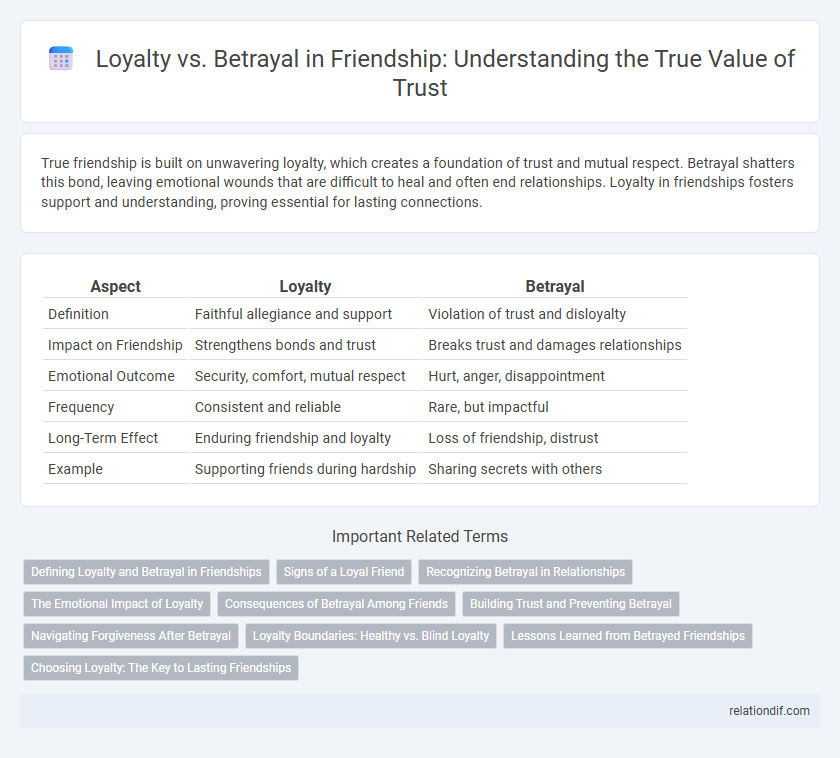True friendship is built on unwavering loyalty, which creates a foundation of trust and mutual respect. Betrayal shatters this bond, leaving emotional wounds that are difficult to heal and often end relationships. Loyalty in friendships fosters support and understanding, proving essential for lasting connections.
Table of Comparison
| Aspect | Loyalty | Betrayal |
|---|---|---|
| Definition | Faithful allegiance and support | Violation of trust and disloyalty |
| Impact on Friendship | Strengthens bonds and trust | Breaks trust and damages relationships |
| Emotional Outcome | Security, comfort, mutual respect | Hurt, anger, disappointment |
| Frequency | Consistent and reliable | Rare, but impactful |
| Long-Term Effect | Enduring friendship and loyalty | Loss of friendship, distrust |
| Example | Supporting friends during hardship | Sharing secrets with others |
Defining Loyalty and Betrayal in Friendships
Loyalty in friendship embodies unwavering support, trustworthiness, and a commitment to standing by each other through challenges. Betrayal, conversely, involves breaking that trust through actions like dishonesty, disloyalty, or abandoning a friend in times of need. Understanding these definitions helps clarify the essential qualities that sustain meaningful and lasting friendships.
Signs of a Loyal Friend
A loyal friend consistently demonstrates trustworthiness through honest communication and unwavering support during challenges. They respect boundaries, keep confidences confidential, and prioritize your well-being without expecting anything in return. Signs of loyalty include reliability, empathy, and a genuine commitment to your happiness and growth over time.
Recognizing Betrayal in Relationships
Recognizing betrayal in relationships involves noticing subtle shifts in behavior such as dishonesty, broken promises, and secretive actions. Loyalty manifests through consistent support, trustworthiness, and genuine concern, while betrayal fractures these foundations, causing emotional distress and mistrust. Being alert to these signs enables individuals to protect their emotional well-being and maintain healthy, authentic friendships.
The Emotional Impact of Loyalty
Loyalty in friendship cultivates trust, security, and emotional stability, reinforcing strong bonds that withstand challenges. Acts of steadfast loyalty promote a deep sense of belonging and mutual respect, essential for long-lasting connections. Experiencing loyalty triggers increased oxytocin levels, boosting feelings of happiness and emotional well-being.
Consequences of Betrayal Among Friends
Betrayal among friends often results in a profound loss of trust that can permanently damage or end the relationship. The emotional consequences include feelings of hurt, anger, and isolation, which may lead to long-term psychological effects such as anxiety or depression. Rebuilding loyalty requires consistent effort, honesty, and forgiveness, and even then, some friendships may never fully recover from the breach.
Building Trust and Preventing Betrayal
Loyalty in friendship is anchored by consistent honesty, open communication, and mutual respect, which foster deep trust between individuals. Building trust requires transparent actions and reliable support during both good times and challenges, creating a secure emotional bond. Preventing betrayal involves setting clear boundaries and addressing conflicts promptly, ensuring that both parties understand and uphold the values of the friendship.
Navigating Forgiveness After Betrayal
Navigating forgiveness after betrayal in friendship requires recognizing the impact of disloyalty on trust and emotional well-being. Patience, empathy, and honest communication are essential to rebuild damaged bonds and restore mutual respect. Understanding shared values and setting clear boundaries can prevent future breaches, fostering stronger, more resilient connections.
Loyalty Boundaries: Healthy vs. Blind Loyalty
Loyalty boundaries in friendship distinguish between healthy loyalty, which fosters trust, respect, and mutual support, and blind loyalty, which can lead to enabling harmful behavior or ignoring critical issues. Healthy loyalty involves maintaining personal integrity while supporting friends, ensuring that loyalty does not compromise one's values or well-being. Blind loyalty often results in neglecting boundaries and tolerating betrayal, ultimately damaging relationships and personal growth.
Lessons Learned from Betrayed Friendships
Betrayed friendships teach the importance of setting boundaries and recognizing red flags early, helping to protect emotional well-being. Experiencing betrayal sharpens intuition, fostering stronger discernment in future relationships. These lessons emphasize the value of loyalty and encourage deeper appreciation for genuine, trustworthy friends.
Choosing Loyalty: The Key to Lasting Friendships
Choosing loyalty in friendships builds a foundation of trust and mutual respect, essential for long-term bonds. Loyal friends provide consistent support during challenges, reinforcing emotional security and deepening connections. Prioritizing loyalty over betrayal cultivates enduring relationships that withstand conflicts and foster genuine understanding.
Loyalty vs Betrayal Infographic

 relationdif.com
relationdif.com